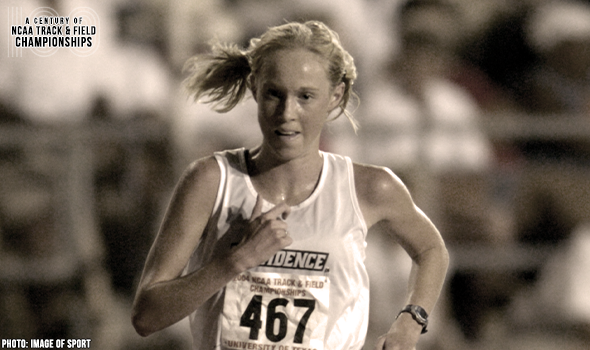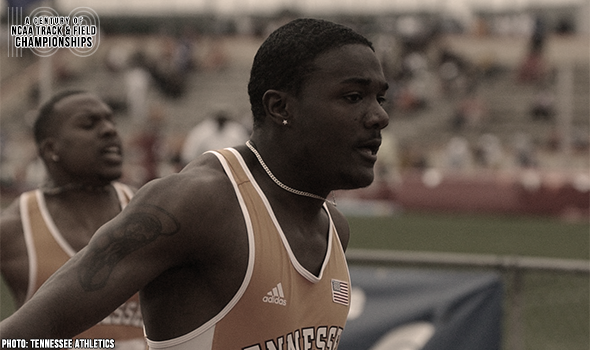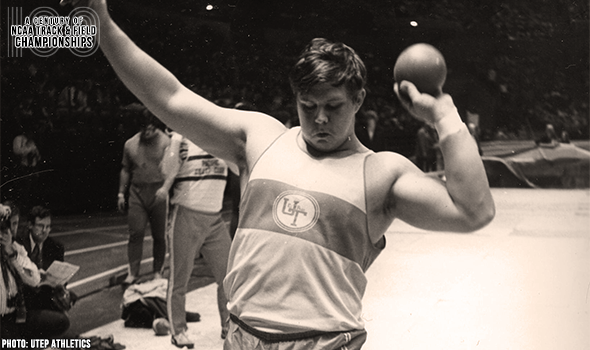
Falcon Flew To NCAA Distance Glory
Like his surname, Joe Falcon always swooped in at the right moment.
Known for his ferocious kick late in the race, Falcon captured seven individual NCAA titles between cross country, indoor track & field and outdoor track & field while competing for the University of Arkansas under legendary USTFCCCA Hall of Fame coach John McDonnell.
Falcon’s winning ways nearly started in the fall of his sophomore year at the 1986 NCAA Division I Cross Country Championships in Tucson, Arizona, but a recessed sprinkler head had other ideas. The Razorback standout ran on the shoulder of eventual winner Aaron Ramirez for most of the race before pulling away as they ascended the final hill. Shortly after, Falcon stepped in a sprinkler hole on the golf course, tumbled to the ground and had to settle for a runner-up finish (Don’t worry: Falcon atoned for that mishap the following year to become the program’s first individual national champion in cross country).
That incident most likely fueled Falcon’s fire over the next few years as little kept him from NCAA glory from that point forward.
After winning his first NCAA title the following March in the indoor 3000 meters, Falcon closed in a scintillating 55.1 to capture the 10,000-meter crown at the 1987 NCAA Division I Outdoor Track & Field Championships. That would be the first of seven 10K crowns for the Razorbacks over the years, which has helped them become the highest-scoring program in that event in meet history.
Falcon went back-to-back in the indoor 3000 the following year and added the mile crown to his ledger for good measure. When he returned to the outdoor meet a few months later, Falcon had his eyes squarely set on the 1500-meter title, something only one other man in program history was able to bring back to Fayetteville (Frank O’Mara in 1983).
True to form, Falcon stayed right behind the leader (Steve Balkey of Penn State) and blew past him in the final 500 meters. Falcon had company, though, as the Indiana duo of Mark Deady and Charles Marsala went with him. The Razorback runner held off the Hoosiers’ harriers to win by one second, 3:38.91 to 3:39.91 (Marsala) and 3:39.92 (Deady).
To this day, Falcon remains the only man in meet history to win national titles in both the 1500/mile and the 10,000 meters — and is just one of two men to score in both of those events at the national meet in his career (Two-time The Bowerman finalist Lawi Lalang is the other, winning the 10K title in 2013 and finishing runner-up in the 1500 one year later).
Falcon snagged another NCAA indoor mile crown in 1989 and anchored the Arkansas DMR team to an all-time world best in the DMR at the Penn Relays that same year. However, Falcon’s quest to defend his 1500-meter crown fell 1200 meters short in June after he was tripped and pushed to the ground less than one lap into the NCAA final, in what would be his final collegiate race.
The NCAA and collegiate track & field will mark a momentous milestone in the spring of 2021 -- the 100th anniversary of the NCAA Championships and with that, the NCAA Track & Field Championships. In June 1921, the University of Chicago hosted the first track & field championships in NCAA history.
This point can’t be emphasized enough: Not only was the event the first for NCAA track & field, but the first championships for any sport under the sponsorship of the NCAA.
To celebrate, over each of the next 365 days, the U.S. Track & Field and Cross Country Coaches Association (USTFCCCA) will celebrate moments, student-athletes, and coaches that have made a century’s worth of championships special. From humble beginnings to important historical milestones to the modern-day, collegiate track & field has evolved with the American society.
The 2021 edition of the NCAA Division I Outdoor Track & Field Championships begin with preliminary round action on May 27-29 in Jacksonville, Fla., and College Station, Texas. The championships final site and culmination of the celebration is slated for June 9-12, 2021 at the newly rebuilt Hayward Field in Eugene, Ore.

Providence’s Smith Left Field In The Dust
Kim Smith won the 5000 meters at the 2004 NCAA Division I Outdoor T&F Championships by 36.04 seconds in 15:48.86 for the largest margin of victory in meet history.

Gatlin Doubled Up In Back-To-Back Years
Justin Gatlin completed back-to-back 100-200 doubles at the NCAA DI Outdoor T&F Championships in 2001 & 2002. He went 10.08/20.11 & 10.22/20.18 in those respective years.

UTEP’s Hoglund First To Crack 70-Foot Barrier
Hans Hoglund was the first man to touch the 70-foot barrier in the SP at the NCAA DI Outdoor T&F Championships. He also won by more than 4 feet with his 21.33m (70-0) heave in 1975.

LSU’s Hobbs Couldn’t Be Caught In 2018
Aleia Hobbs anchored LSU to a 4×100 relay MR of 42.25 & then doubled back to win the 100 by 0.23 seconds at the 2018 NCAA DI Outdoor T&F Championships.

Michael Johnson Had 1990 NCAAs To Remember
All eyes were on Michael Johnson of Baylor in the 4×400-meter relay at the 1990 NCAA Division I Outdoor Track & Field Championships.

Riley Completed Unprecedented Double In 2012
Andrew Riley completed the only 100-110H double in NCAA DI Outdoor T&F Championships history in 2012. Riley won the 100 in 10.27 & then captured the 110H crown in 13.53

Leatherwood Rolled To Back-To-Back 400 Titles
Lillie Leatherwood won back-to-back 400-meter titles at the NCAA Division I Outdoor T&F Championships in 1986 & 1987. She set a meet record of 50.90 in that second year.

Iowa’s Jones Made Distance History
Charles “Deacon” Jones set a meet record in the 2-mile at the 1957 NCAA Outdoor Track & Field Championships with his time of 8:57.6.

Locke Doubled Up On Sprint Titles In 1926
Roland Locke entered the 1926 NCAA Outdoor T&F Championships as the WR holder in the 220. He left with the meet record in that event (20.9) & also won the 100 in 9.9.

McLain Bounded To All-Conditions TJ Best
Erica McLain won the triple jump at the 2008 NCAA DI Outdoor Track & Field Championships by nearly two feet! McLain bounded to an all-conditions meet best at 14.60m (47-11).

